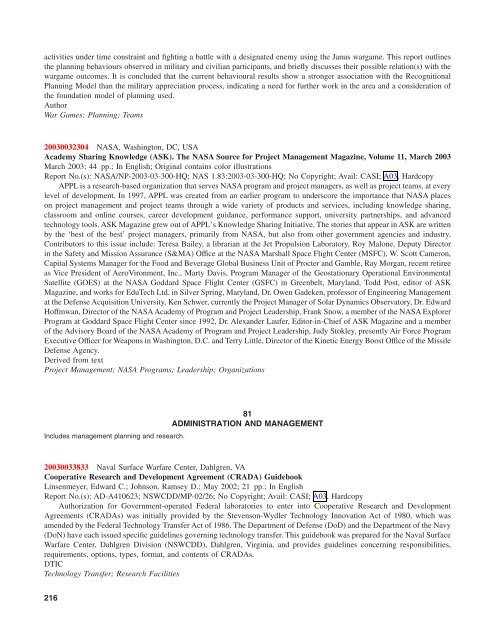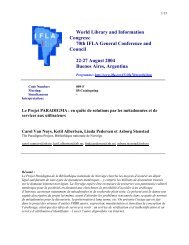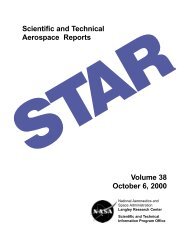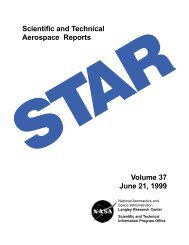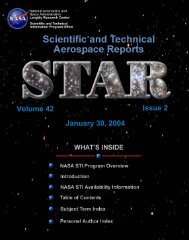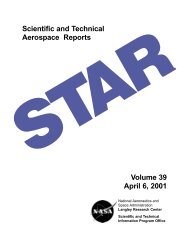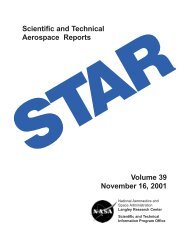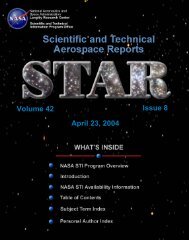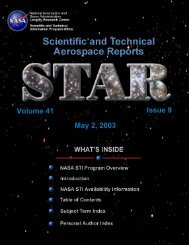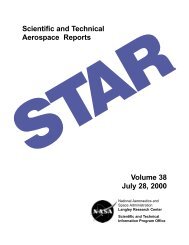Issue 10 Volume 41 May 16, 2003
Issue 10 Volume 41 May 16, 2003
Issue 10 Volume 41 May 16, 2003
- TAGS
- volume
- 202.118.250.135
Create successful ePaper yourself
Turn your PDF publications into a flip-book with our unique Google optimized e-Paper software.
activities under time constraint and fighting a battle with a designated enemy using the Janus wargame. This report outlines<br />
the planning behaviours observed in military and civilian participants, and briefly discusses their possible relation(s) with the<br />
wargame outcomes. It is concluded that the current behavioural results show a stronger association with the Recognitional<br />
Planning Model than the military appreciation process, indicating a need for further work in the area and a consideration of<br />
the foundation model of planning used.<br />
Author<br />
War Games; Planning; Teams<br />
<strong>2003</strong>0032304 NASA, Washington, DC, USA<br />
Academy Sharing Knowledge (ASK). The NASA Source for Project Management Magazine, <strong>Volume</strong> 11, March <strong>2003</strong><br />
March <strong>2003</strong>; 44 pp.; In English; Original contains color illustrations<br />
Report No.(s): NASA/NP-<strong>2003</strong>-03-300-HQ; NAS 1.83:<strong>2003</strong>-03-300-HQ; No Copyright; Avail: CASI; A03, Hardcopy<br />
APPL is a research-based organization that serves NASA program and project managers, as well as project teams, at every<br />
level of development. In 1997, APPL was created from an earlier program to underscore the importance that NASA places<br />
on project management and project teams through a wide variety of products and services, including knowledge sharing,<br />
classroom and online courses, career development guidance, performance support, university partnerships, and advanced<br />
technology tools. ASK Magazine grew out of APPL’s Knowledge Sharing Initiative. The stories that appear in ASK are written<br />
by the ‘best of the best’ project managers, primarily from NASA, but also from other government agencies and industry.<br />
Contributors to this issue include: Teresa Bailey, a librarian at the Jet Propulsion Laboratory, Roy Malone, Deputy Director<br />
in the Safety and Mission Assurance (S&MA) Office at the NASA Marshall Space Flight Center (MSFC), W. Scott Cameron,<br />
Capital Systems Manager for the Food and Beverage Global Business Unit of Procter and Gamble, Ray Morgan, recent retiree<br />
as Vice President of AeroVironment, Inc., Marty Davis, Program Manager of the Geostationary Operational Environmental<br />
Satellite (GOES) at the NASA Goddard Space Flight Center (GSFC) in Greenbelt, Maryland, Todd Post, editor of ASK<br />
Magazine, and works for EduTech Ltd. in Silver Spring, Maryland, Dr. Owen Gadeken, professor of Engineering Management<br />
at the Defense Acquisition University, Ken Schwer, currently the Project Manager of Solar Dynamics Observatory, Dr. Edward<br />
Hoffmwan, Director of the NASAAcademy of Program and Project Leadership, Frank Snow, a member of the NASA Explorer<br />
Program at Goddard Space Flight Center since 1992, Dr. Alexander Laufer, Editor-in-Chief of ASK Magazine and a member<br />
of the Advisory Board of the NASA Academy of Program and Project Leadership, Judy Stokley, presently Air Force Program<br />
Executive Officer for Weapons in Washington, D.C. and Terry Little, Director of the Kinetic Energy Boost Office of the Missile<br />
Defense Agency.<br />
Derived from text<br />
Project Management; NASA Programs; Leadership; Organizations<br />
81<br />
ADMINISTRATION AND MANAGEMENT<br />
Includes management planning and research.<br />
<strong>2003</strong>0033833 Naval Surface Warfare Center, Dahlgren, VA<br />
Cooperative Research and Development Agreement (CRADA) Guidebook<br />
Linsenmeyer, Edward C.; Johnson, Ramsey D.; <strong>May</strong> 2002; 21 pp.; In English<br />
Report No.(s): AD-A4<strong>10</strong>623; NSWCDD/MP-02/26; No Copyright; Avail: CASI; A03, Hardcopy<br />
Authorization for Government-operated Federal laboratories to enter into Cooperative Research and Development<br />
Agreements (CRADAs) was initially provided by the Stevenson-Wydler Technology Innovation Act of 1980, which was<br />
amended by the Federal Technology Transfer Act of 1986. The Department of Defense (DoD) and the Department of the Navy<br />
(DoN) have each issued specific guidelines governing technology transfer. This guidebook was prepared for the Naval Surface<br />
Warfare Center, Dahlgren Division (NSWCDD), Dahlgren, Virginia, and provides guidelines concerning responsibilities,<br />
requirements, options, types, format, and contents of CRADAs.<br />
DTIC<br />
Technology Transfer; Research Facilities<br />
2<strong>16</strong>


